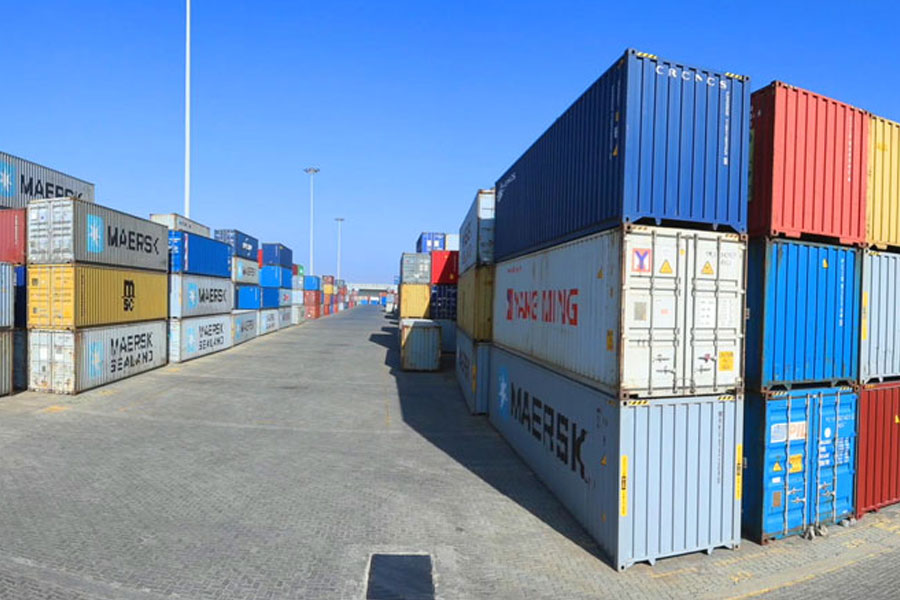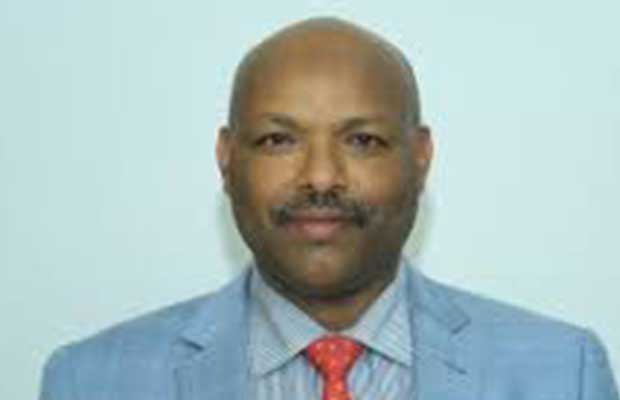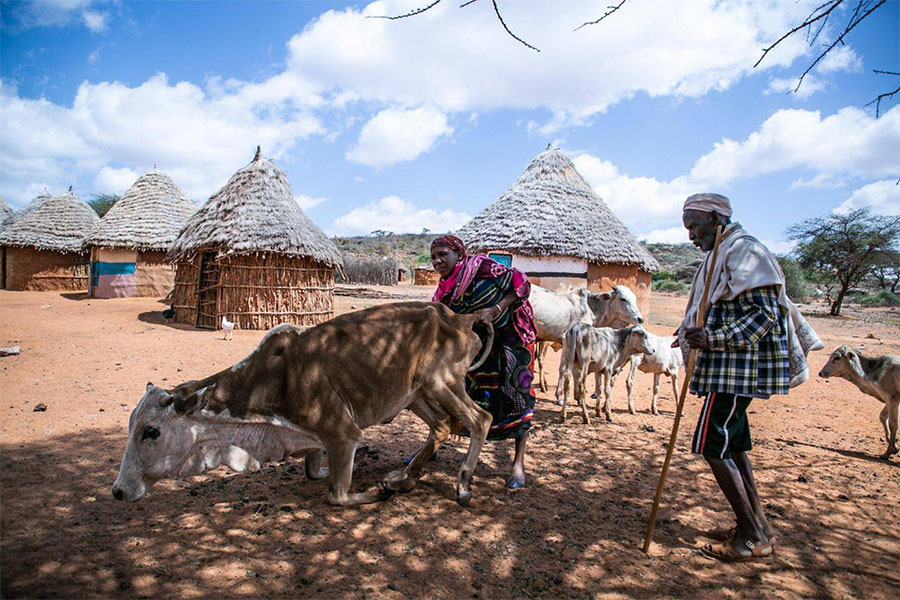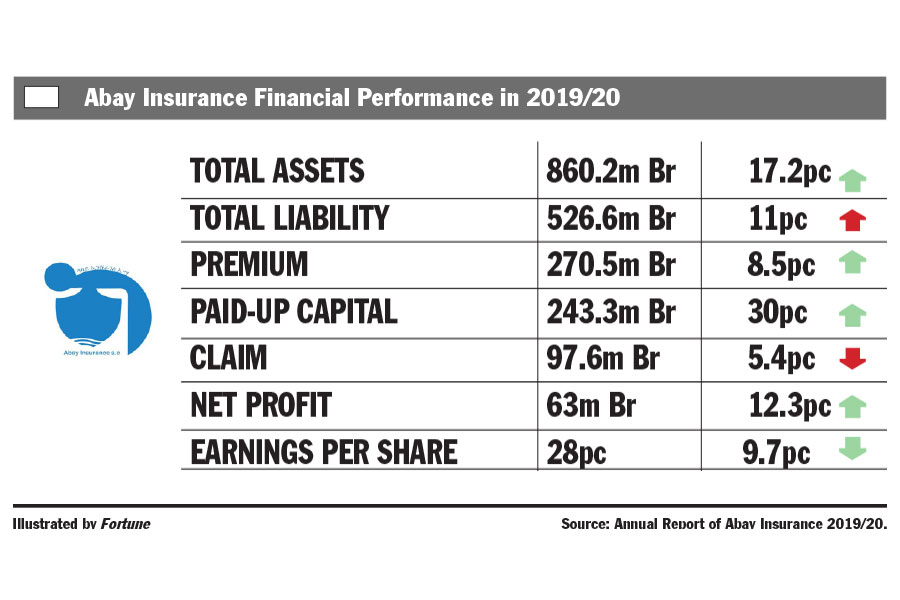
Jan 5 , 2020
By MESAY BERHANU ( FORTUNE STAFF WRITER
)
Bunna International Bank, one of the mid-sized banks, had a positive year last year, increasing profits by over half. Yet the earnings per share (EPS) paid out in dividends has remained the same over three consecutive years.
In the reported period, the company increased profits by 51.6pc to 472.5 million Br. Despite the huge leap in profitability, its EPS remained at about 286.95 Br over the past three consecutive periods. Last year's dividend to its 13,000 shareholders showed a marginal three percent increase.
Mulugeta Alemayehu, CEO of Bunna, argues that EPS stagnated due to the Bank's decision to increase its paid-up capital.
The Bank increased its paid-up capital by 20pc to nearly 1.8 billion Br, making it one of the highest capitalised banks.
Sewale Abate (PhD), the chairperson of the board of directors of the Bank and associate dean for Research & Technology Transfer at Addis Abeba University, argues the management made the right decision to increase the number of shares to expand the capital base.
"The decision is timely to build up the Bank’s competitiveness in the long run when the finance sector soon opens up to external competition," he said.
However, Abdulmenan Mohammed, a financial statement analyst with close to two decades of experience, cautions the management to look into its capitalisation policy and said it should aim to maximise returns to its shareholders.
The Bank's profitability is due to increased performance in financial intermediation operations and other areas of business. Interest on loans, advances and investment in NBE bonds have increased by 24pc and reached 1.3 billion Br. The increase in non-interest income, such as fees and commissions, also rose by 59pc to reach 415.4 million.
Bunna also succeeded in achieving a 22pc increase in foreign exchange dealings, collecting 77.1 million Br in the last fiscal year.
“Achieving such growth in all areas of income-generating activities is impressive,” said Abdulmenan.
Providing reduced interest lending rates to exporters, timely response to customers’ demands and flexible loan arrangements were instrumental to attracting and retaining customers who generate foreign currency, according to the CEO.
Along with income, the expenses of the company also swelled. Interest it paid on deposits increased by 12.9pc and reached 439.8 million Br. Personnel, as well as other operating expenses, have increased markedly by 34.5pc to 716.7 million Br.
Expanding by 34 branches in the last year and a salary raise designed to retain staff were the major reasons for jump in expenses, according to the CEO.
Bunna also increased its provisions for the impairment of loans and other assets by 19pc to 50.9 million Br. Its total assets have also expanded by more than 11.3pc to reach 14.5 billion Br.
"The Bank's asset growth is far lower than that of other banks that have released their financial reports recently,” Abdulmenan observed.
Bunna disbursed loans and advances of 8.2 billion Br, an increase of 19pc. It also mobilised deposits of 10.6 billion Br, an increase of 6.4pc.
The growth of deposits at Bunna is the lowest recorded in the industry over several years, according to Abdulmenan.
“This shows it must have faced serious competition," he said, "the management should come up with a strategy to reverse this."
In November 2018, the management of the bank made a structural change in deposit, significantly cutting time deposit from 18pc to below three percent, a reduction of 1.2 billion Br due to high interest paid to time deposit.
"The bank decided to limit time deposits at five percent to effectively manage the associated costs in interest payment," said Mulugeta.
The loan to deposits ratio of Bunna increased by eight percentage points to 77pc, which the expert commends, however, he cautioned the management from a further increase in the ratio.
“The loan-to-deposit ratio of Bunna is so high and the management should be very careful from increasing it further,” he said.
The Bank’s investment of 3.3 billion Br in NBE bonds accounted for 22.5pc of its total assets and 30.8pc of its total deposits showing a slight increase from the earlier year.
The liquidity level of Bunna has declined both in terms of value and relative terms. Its cash and bank balances decreased by 14.6pc to 2.3 billion Br.
Its ratio of liquid assets to total assets went down to 15.7pc from 20.5pc and the ratio of liquid assets to total liabilities declined to 19.1pc from 24pc.
"The decrease must have been due to a huge increase in the loan-to-deposit ratio," said Abdulmenan. "The management should take extra caution from a further reduction as it operated with tight liquidity."
Effective utilisation of the idle cash caused the tight liquidity situation, according to Mulugeta.
"Unlike other banks," said Mulugeta, "we don't include the margin in the loan-to-deposit ratio calculation, which could have pushed the ratio further up."
The capital adequacy ratio of the bank has bumped to 27.4pc from 26pc.
“As Bunna has strong capital," said Abdulmenan, "it should use its capital more efficiently."
Usman Dawa, a representative of a shareholder community association having 25 members, says he is generally satisfied with the growth and profitability of the bank.
However, Usman says that the Bank should have achieved much better given its decade-long experience.
"By deploying more qualified personnel, the Bank could provide rather efficient services to attract and retain potential customers that would further boost its profitability," he said.
Bunna ranked 11 out of 16 private banks representing 1.9pc of the market share when it had a total of 176 branches two years ago.
PUBLISHED ON
Jan 05,2020 [ VOL
20 , NO
1028]

Fortune News | Mar 19,2022

Exclusive Interviews | Jan 05,2020

Fortune News | Feb 01,2020

Radar | Sep 08,2019

News Analysis | May 11,2025

Agenda | Jan 29,2022

Fortune News | Jan 05,2019

Fortune News | Jan 16,2021

News Analysis | Mar 09,2024

Radar | Oct 28,2023

Dec 22 , 2024 . By TIZITA SHEWAFERAW
Charged with transforming colossal state-owned enterprises into modern and competitiv...

Aug 18 , 2024 . By AKSAH ITALO
Although predictable Yonas Zerihun's job in the ride-hailing service is not immune to...

Jul 28 , 2024 . By TIZITA SHEWAFERAW
Unhabitual, perhaps too many, Samuel Gebreyohannes, 38, used to occasionally enjoy a couple of beers at breakfast. However, he recently swit...

Jul 13 , 2024 . By AKSAH ITALO
Investors who rely on tractors, trucks, and field vehicles for commuting, transporting commodities, and f...

Jun 28 , 2025
Meseret Damtie, the assertive auditor general, has never been shy about naming names...

Jun 21 , 2025
A well-worn adage says, “Budget is not destiny, but it is direction.” Examining t...

Jun 14 , 2025
Yet again, the Horn of Africa is bracing for trouble. A region already frayed by wars...

Jun 7 , 2025
Few promises shine brighter in Addis Abeba than the pledge of a roof for every family...